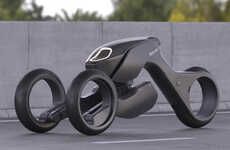A Zurich research team developed the Distributed Flight Array, a series of 3D-printed drones capable of self-assembly. The flying honeycomb-shaped helicopter bots fly in extremely irregular patterns on their own, but they are able to detect the presence of similar drones nearby and connect to form a larger unit using magnets. As a whole, the conjoined units are much more controlled, and function as a highly intelligent system.
Individually, each modular unit relays information to other drones to determine how much force will be required during flight. When a disturbance in balance is detected, each drone is able to set itself back the correct position. This project by the Zurich's Institute for Dynamic Systems and Control (IDSC) was not developed for any specific purpose, although it could have huge implications for the future of transportation.
Self-Grouping Drones
The Distributed Flight Array Drones are 3D-Printed
Trend Themes
1. Self-grouping Drones - Disruptive innovation opportunity: Creating intelligent systems of self-assembling drones that can exponentially increase their capabilities.
2. Distributed Flight Array - Disruptive innovation opportunity: Designing 3D-printed drones with the ability to detect and connect with one another for increased control and intelligence.
3. Modular Drone Units - Disruptive innovation opportunity: Developing modular drones that can relay information and self-correct for better flight performance and balance.
Industry Implications
1. Aerospace - Disruptive innovation opportunity: Integrating self-grouping drones into the aerospace industry to enhance surveillance, search and rescue, and delivery operations.
2. Transportation - Disruptive innovation opportunity: Utilizing distributed flight arrays in the transportation industry to revolutionize the concept of autonomous flying vehicles.
3. Technology - Disruptive innovation opportunity: Exploring the potential of modular drone units in the technology industry for applications such as swarm robotics and advanced automation.






